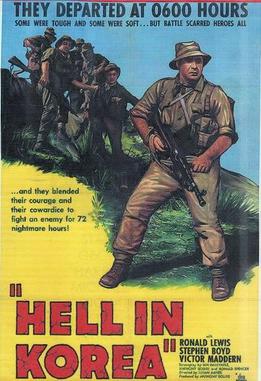When I think of anti-war films, I tend to zoom right in on the 1960's, right as the Vietnam War jumped into full gear and moviegoing audiences amped up their cynicism. Well, sorta. The theme of today's review intro? The Brits, ahead of the game in the dark, gloomy, cynical anti-war film. I'll obviously mention some others later, but for now, here's 1956's Hell in Korea.
Commanded by inexperienced Lieutenant Butler (George Baker), a 15-man patrol leaves its base and heads out on a reconnaissance patrol. The patrol is split up down the middle, half professional soldiers and the other half National Service men called up when the fighting in Korea started. Their objective is simple; march out to a seemingly isolated village and find out if it is garrisoned or being used at all by North Korean and Chinese forces. Short answer? It ain't, but on the way back to base, the patrol is cut off by a much larger Chinese force. Butler tries to pull off a delaying action, but more Chinese troops quickly arrive on the scene. Butler's patrol has only one alternative...cut back through the abandoned village and fort up above it in a mountainside temple cut perched next to a cliff before they're cut to pieces. If they can make it...
There's something to be said for movies like this. By the late 1950's, studios in Hollywood and London alike were starting to focus more on BIG movies, EPIC movies with a huge scale and a bigger cast. Then there's movies like this. Filmed in black and white, 'Korea' focuses on one patrol, its mission, and its fallout when things go wrong. There is no bigger picture of the war. The focus is on one patrol. It was filmed in a barren location (I can't find where) and feels removed from any civilized part of the world. Cut-off from their own forces, the patrol is on their own. It can be stories like this that work so well because for all the huge battles and large-scale clashes, there were far more stories like this when it comes to a realistic war.
Two movies came to mind while watching this 1956 war drama, both like-minded stories and outlooks, as I thought about what to write. Wouldn't you know it? Both are British, 1961's The Long and the Short and the Tall (liked it) and 1959's Yesterday's Enemy (loved it). These aren't movies interested in glorifying war or showing it for all its heroism and bravery. It was about survival, plain and simple. That's where director Julian Amyes' film works best. The men on the patrol come from a variety of backgrounds, some don't like each other to the point it borders on hate, and they aren't looking for medals or notoriety. They want to survive and get home, war be damned. There's honesty in that sentiment. There's nothing heroic about getting your head blown off on a desolate Korean hillside. The stark black and white photography certainly adds something to that bleak, no-hope filled anti-war sentiment.
What originally caught my eye though wasn't the message or anti-war feelings. It was the cast! Featuring a Lost Patrol/Sahara/Bataan-like ensemble, the cast here is the patrol. We don't meet anyone back at HQ, no one on the enemy, NO ONE else. The cast is the patrol. That's it, and that's all. Though none get key, lead parts, it's cool to see Michael Caine (in his screen debut), Robert Shaw and Stephen Boyd in early roles. As the inexperienced but intelligent Lt. Butler, Baker is very solid in the best performance, getting help from Harry Andrews and Stanley Baker as the embattled veterans on the patrol, Andrews the tough as hell sergeant, Baker the Chinese-hating corporal. Also look for familiar faces in Michael Medwin, Ronald Lewis, Victor Maddern, Percy Herbert, Harry Landis and Robert Brown as members of the patrol.
As simple, straightforward and effective as 'Korea' can be at times, there are moments that feel like misfires. There's some key moments in firefights where the camera moves away from where the action should be. Characters being killed off is almost an afterthought, brushed away as quick as the camera can move. Things feel a bit rushed at just 80 minutes, much of the downtime between battles spent with the patrol bitching and moaning about the state they find themselves in. Some of it builds the tension, helps us get to know the men at least a little bit, but it also gets repetitive when it should be getting interesting as the bullets are supposed to start flying.
It is is a good, interesting movie, but not a great one. I loved the temple set, up on a hilltop seemingly in another world. I liked Malcom Arnold's score, somewhat reminiscent of his most famous score, The Bridge on the River Kwai. So while it isn't a great movie with some big flaws, this is still a little-known, mostly forgotten war film that is definitely worth catching up with. Track it down if you can. I happened to stumble across it on Turner Classic Movies recently.
Hell in Korea (1956): ** 1/2 /****


i think the studio amped the cynicism and the audience watched the movies and then everything changed with everyone. either way, i feel that an Anti War Film is really not Anti War, because there are many Anti War films about WW2, which most aren't against, stopping Hitler... but an Anti War Film meaning it's against the usual War Film making it an Anti War-Film, veering from the usual gung-ho propaganda and... I have to check this one out. I recently saw Monte Hellman's BACK DOOR TO HELL and this entry seems similar
ReplyDelete